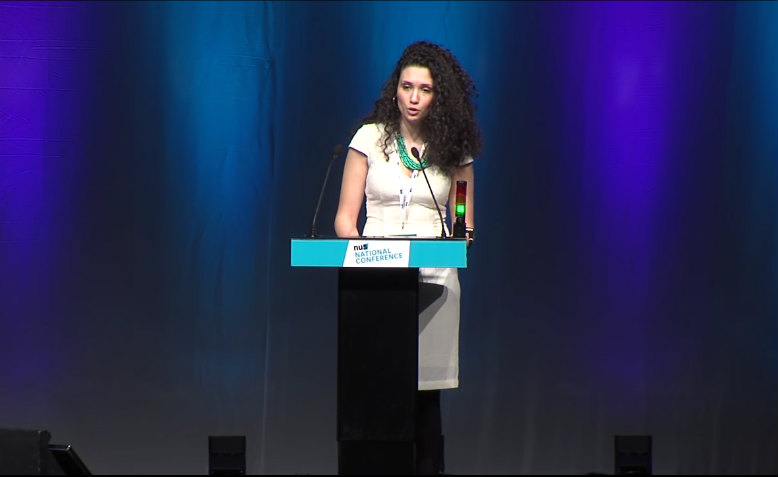 Malia Bouattia, new president of the NUS. Photo: YouTube
Malia Bouattia, new president of the NUS. Photo: YouTube
The media’s reporting of the election of Malia Bouttia has ignored the woman and her policies
I was delighted to hear that Malia Bouattia won the election for president of National Union of Students. She is the first black woman NUS president and the first Muslim to hold the position. I know her and her committed campaigning over racism, Islamophobia and war as the representative of NUS Black students.
I was more than a little taken aback to read the BBC website report on her election: it started with a paragraph which said she had refused to denounce ISIS, then carried on with allusions to anti-Semitism, reported her support for the Palestinian resistance, and said virtually nothing about any other policies that she might have.
In its latest version, Labour MP John Mann is quoted as saying that NUS has to do more to root out anti-Semitism. That may or may not be true, but Malia can hardly be blamed for any deficiencies in this department.
But, as with Jeremy Corbyn, who has nothing to do with some recently reported anti-Semitic incidents within the Labour Party, she is already being made guilty by association.
Any balanced article written on the day of her election might be expected to look at her background, what she had achieved, her policies on issues such as austerity and education, what she intended to do to represent the student body.
A Muslim woman president, especially one who has a record of campaigning and standing up for herself, isn’t treated like that, however. The media can just about stomach a Muslim woman baking the queen’s birthday cake, but not one who’s actually going to campaign on some of the most serious issues facing students.
So immediately the whole narrative about her is that she’s extremist, associates with extremists, or at least Palestinians, and of course that she’s a Muslim.
Former NUS president Wes Streeting, now a Labour MP, has tweeted that NUS is ‘lost’. He must feel that it is to him and his fellow Blairites. Long a rite of passage for right wing Labour MPs, the NUS presidency has been all too often held by those who did little to fight for their own members, helplessly observing the loss of free higher education and the commercialisation of universities.
Malia’s election changes that. Her most recent profile has been round a series of meetings opposing the government’s Prevent strategy. Her background as someone of Algerian descent gives her a first-hand knowledge of imperialism and racism. That means she understands the concerns of many of the students she will be representing.
The backlash against her has begun on day one. She will need all the support and solidarity that she can get. But today marks a victory for those who oppose war and racism. And a defeat for those who don’t.

